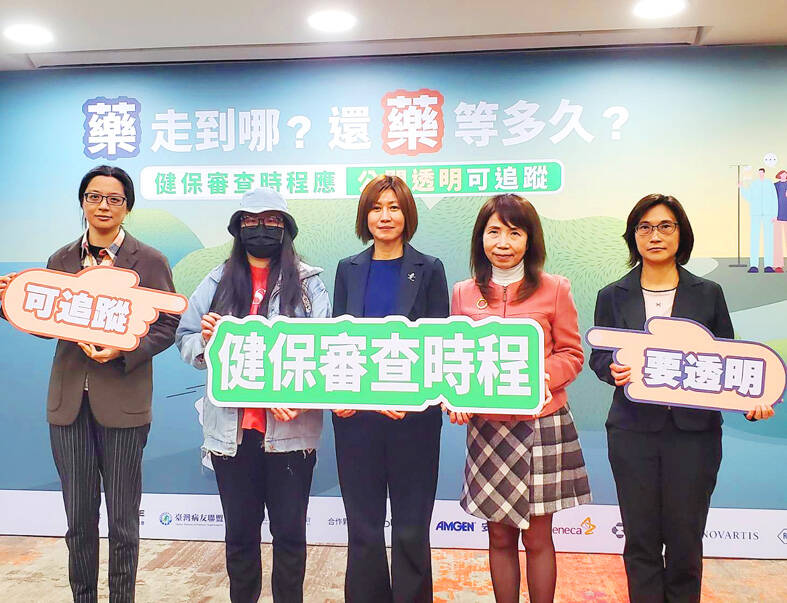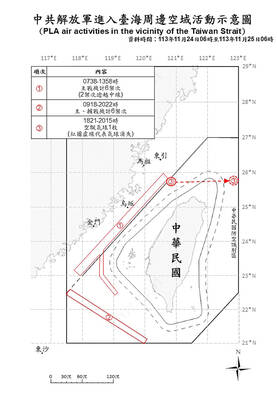Three patient support groups yesterday called on the National Health Insurance Administration (NHIA) to ensure transparency and traceability in new drug review procedures.
The Hope Foundation for Cancer Care, Taiwan Alliance of Patients’ Organizations and Taiwan Foundation for Rare Disorders held a news conference in Taipei yesterday morning to express their frustration with drug reviews.
A woman surnamed Chen (陳), who helped care for her mother who has had cancer since 2020, said the targeted therapy for treating her mother’s stage four lung cancer is not covered by National Health Insurance (NHI), so her family had spent nearly NT$6 million (US$190,992) out of pocket over the past four years.

Photo: Lin Hui-chin, Taipei Times
She said the targeted therapy was proposed for NHI coverage early last year, but almost two years have gone by and they still do not know if or when the administration would review it.
The average time for a new drug to pass an NHIA review is about 783 days, or 26.1 months, said Janice Chen (陳昭姿), Koo Foundation Sun Yat-Sen Cancer Center’s pharmacy department director, who has been involved in the administration’s drug review meetings for many years.
However, the NHIA had previously said the average time it took for a coverage review of new cancer drugs was about 411 days, or 13.7 months, the groups said.
New drugs had passed reviews faster when the NHI system was launched about 30 years ago, but now more limitations exist, making it difficult to predict when a new drug would pass a review, Janice Chen said.
The NHIA should make the process open and transparent, allowing doctors and patients to adjust their treatment strategies according to the expected progress, she said.
Regardless of whether a new drug eventually passes review, the process should be open, allowing patients to track a drug’s review progress so they can prepare mentally and make better decisions for their healthcare, Hope Foundation for Cancer Care CEO Elaine Su (蘇連瓔) said.
The groups said the Food and Drug Administration has clear regulations for the registration, testing and review of medicinal products, allowing people to know when review meetings are to be held, whether a company needs to provide additional information and when the review would be completed.
Hopefully, the NHIA’s review of new drugs for NHI coverage could have the same transparency and traceability, they said.

Theaters and institutions in Taiwan have received 28 threatening e-mails, including bomb threats, since a documentary critical of China began being screened across the nation last month, the National Security Bureau said yesterday. The actions are part of China’s attempts to undermine Taiwan’s sovereignty, it said. State Organs (國有器官) documents allegations that Chinese government officials engage in organ harvesting and other illegal activities. From last month to Friday last week, 28 incidents have been reported of theaters or institutions receiving threats, including bomb and shooting threats, if they did not stop showing the documentary, the bureau said. Although the threats were not carried out,

‘GRAY ZONE’ TACTICS: China continues to build up its military capacity while regularly deploying jets and warships around Taiwan, with the latest balloon spotted on Sunday The US is drawing up contingency plans for military deployments in Japan and the Philippines in case of a Taiwan emergency, Japan’s Kyodo news agency reported. They would be incorporated in a first joint operation plan to be formulated in December, Kyodo reported late on Sunday, citing sources familiar with Japan-US relations. A US Marine Corps regiment that possesses High Mobility Artillery Rocket Systems — a light multiple rocket launcher — would be deployed along the Nansei Island chain stretching from Kyushu to Yonaguni near Taiwan, Kyodo said. According to US military guidelines for dispatching marines in small formations to several locations,

The Mainland Affairs Council (MAC) yesterday confirmed that Chinese students visiting Taiwan at the invitation of the Ma Ying-jeou Foundation were almost all affiliated with the Chinese Communist Party (CCP). During yesterday’s meeting convened by the legislature’s Foreign Affairs and National Defense Committee, Democratic Progressive Party (DPP) Legislator Michelle Lin (林楚茵) asked whether the visit was a way to spread China’s so-called “united front” rhetoric, to which MAC Deputy Ministry Shen You-chung (沈有忠) responded with the CCP comment. The MAC noticed that the Chinese individuals visiting Taiwan, including those in sports, education, or religion, have had increasingly impressive backgrounds, demonstrating that the

As Taiwan celebrated its baseball team’s victory in the World Baseball Softball Confederation’s Premier12 on Sunday, how politicians referred to the team in their congratulatory messages reflected the nation’s political divide. Taiwan, competing under the name Chinese Taipei (中華台北隊), made history with its first-ever Premier12 championship after beating Japan 4-0 at the Tokyo Dome. Right after the game, President William Lai (賴清德) congratulated the team via a post on his Facebook page. Besides the players, Lai also lauded the team’s coaching and medical staff, and the fans cheering for them in Tokyo or watching the live broadcast, saying that “every